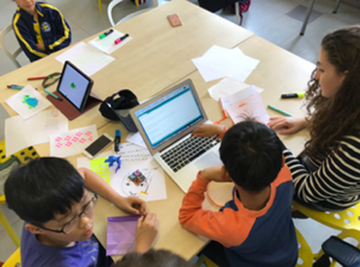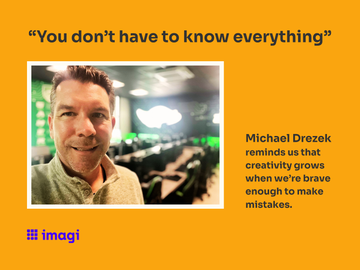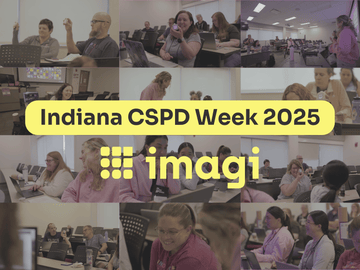Picture this. You were born in the year 1997, and as you were growing up in the early 2000s, Santa would gift you the newest set of Barbie dolls for Christmas, with their silky blond hair and shiny synthetic clothes. As a girl, pink was the color of the ridiculously expensive pencil case you would force your Mom to invest in, with the excuse of the start of a new school year. You still remember the painful time in primary school when you learned the word “engineer” — those e’s, and n’s, and g’s, which would somehow never fall into the right place when you’d sit the much-dreaded spelling test. Besides the oddly placed vowels and consonants, that word would also give you chills because of the meaning it carried: a math-heavy, dry, and dull profession, the one that was “for men”, as your Mom used to tell you (not anymore though! You’d get really mad at her if she did that now…). Does this sound even a tad familiar?

As a sponge, you gradually absorbed the social norms dominating your environment when you were a child — slowly but surely, your subconscious began to sort people’s appearances, objects, and even professions in two imaginary categories — the “for-girls” and “for-boys” boxes (respectively baby pink and Tiffany blue…). Suddenly, a time machine catapulted you into the future: one day, you wake up in the morning, only to realize that you are now in the present. What a journey it’s been! You still like girly clothes, not much has changed. Except — almost two decades have passed, and you still know absolutely nothing about what, for instance, software engineers do: you do get the software part (that’s what you’re always trying to download for free), but when you hear the word Python, the first thought that comes to mind is confined to the reptiles you see in the news, making their ways undisturbed into the homes of terrorized residents in Australia. A day comes when you are staring at the internship advertisements on the Careers website of your Uni: you’re an adult (on paper, at least), next year you will be graduating, and it is high time to do something productive with your summer. You come across this Business & Marketing position at a tiny tech startup in Sweden. As soon as you see the word “tech”, you are about to act like Ariana Grande — say “Thank you, next”, yet something stops your instinctive reaction to click onto the next ad. You begin to wonder — why is it that I feel so nervous about this word?
That is where my tech story begins. When I first applied to imagiLabs for a summer internship in Business Development & Marketing, let’s be honest, I did not think I would be successful. Even though the position was business-oriented, I did not think I would be considered suitable to work in a tech environment, being a Political Science major who had never written a single line of code in her life. Yet, upon submitting my CV, I received an interview invitation, likely thanks to my strong prior social media marketing experience and immaculate academic record. In that moment, I began to unpack my anxieties regarding tech, and think rationally about the irrationality of being afraid of something I didn’t even have much knowledge about (of course, besides the stereotypes I grew up with). The best for last. I actually became excited about the idea of kicking those fears right where it hurts. The mission of imagiLabs was one I could easily identify with: “After all”, I thought to myself, “I support fostering gender equality in STEM disciplines starting from a young age. Who knows, I might be a programmer myself if I had been given the tools (and the courage) to discover coding earlier”. Long story short, after a successful interview, I took a huge leap out of my comfort zone.

I began to work as a Business Development & Marketing Intern for imagiLabs in July 2018 and spent my summer in Stockholm, helping the co-founders, Dóra and Beatrice, with a wide range of tasks — flexibility is key if you’re signing up for a startup environment. From running imagiCase’s user-testing sessions in local Swedish schools, starting imagiLabs’ social media pages and creating content for these platforms, to researching the market and the legal implications of developing new tech gadgets, my work felt exciting, challenging, and rewarding every single day. I split my time between our headquarters in Kista, cool coworking spaces downtown, and running around the city (stressed to make it on time to our workshops, often while carrying a bunch of funny-looking hardware in my bag). As I was preparing for one of our user-testing sessions in the Stockholm International School, I was amazed at myself when I understood how to write a few simple lines of code in Arduino for the first time. Even though the primary focus of my internship was Business Development, I learned some basic coding so that I would better understand what we were just about to teach to a handful of curious and bubbly 8-year-olds. I was basically learning with them. And I loved it.

In Stockholm, I grew in several meaningful ways: professionally, I expanded my knowledge of market sizing, IP law and legal research for startups looking to possibly patent their product ideas, how to run focus groups, user-testing sessions, and workshops for audiences comprising both adults and children. I understood what challenges tech startups struggle with, and also what the working culture of large tech firms like Ericsson looks like, given that our office space was formally in Ericsson’s start-up incubator. I had an amazing time living is Stockholm: it was summer, the days were never-ending with the sun setting past 10 pm, and the people were friendly and welcoming, besides being excellent English speakers — the Swedish language barrier never felt like an actual barrier to me. As much as I could go on bragging about the perks of living in Stockholm in the summer, the most important takeaway for me has been the impact this internship has had on my life. Being surrounded by the many inspiring women in tech I worked with ignited my interest to better understand programming and app development myself. Not long after my internship ended, I came across an opportunity to do just that.
Thanks to an overheard conversation, I came across TAVtech, an intensive four-week coding and cybersecurity fellowship in Tel Aviv, which was set to happen over the winter break of December 2018. My experience at imagiLabs gave me the motivation to apply for this highly selective program, where beginners and more advanced students were welcome alike. After a competitive application, I was chosen to be part of a cohort of 75 students hailing from different countries and colleges such as NYU, Harvard, Stanford, Cornell, UC Berkeley, and the likes. In Tel Aviv, I had daily intensive beginner Python classes and cybersecurity training taught by experts in the Israeli tech scene, and the chance to network with companies like Microsoft, Forter, GE Digital, and Google, where, after almost a month of coding classes, I participated in a Hackathon for social impact. Besides my coursework and the meaningful friendships and connections I made, TAVtech took us to numerous retreats around Israel during the weekends: I got the incredible chance to explore Jerusalem, the Dead Sea, the Negev, and Haifa.


While I still don’t think that I will become an app developer or a data scientist, as I am set to attend Sciences Po in Paris next year and begin my Master’s Degree in Luxury Marketing, these experiences have encouraged me to start learning coding as a hobby and exposed me to fun fields I had never heard about, like UX design. I now understand what an SQL injection is, and have a program installed on my laptop called “Beef”. While I can officially kiss goodbye to my virtual attempts to become vegetarian, I rejoice in having been given the tools to understand how powerful it is to be able to write even just a few lines of code. My next goal is to combine my passion for the high-end fashion industry with tech and hopefully become a digital marketing expert who will leverage both her business skills and newly acquired tech knowledge to achieve social impact in the fashion industry. imagiLabs and TAVtech have equipped me with the courage and skills I need to chase these ambitions. It was an honor to be part of the team and my wish for the future is that, thanks to efforts of imagiLabs, young girls will grow up not fearing, but rather boldly embracing the mindset that tech is “for girls” too
This article was written by Giulia Turchetti, Business Development & Marketing Intern at imagiLabs
Related Articles




